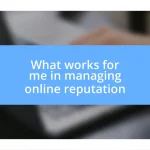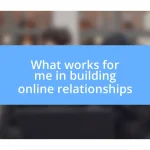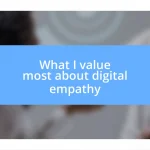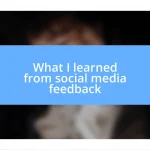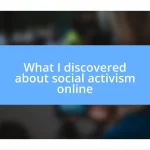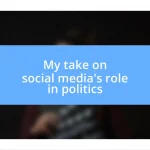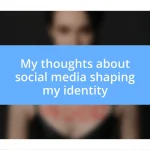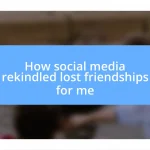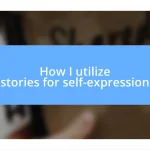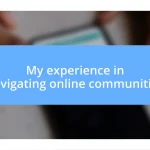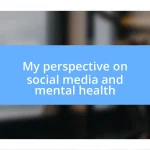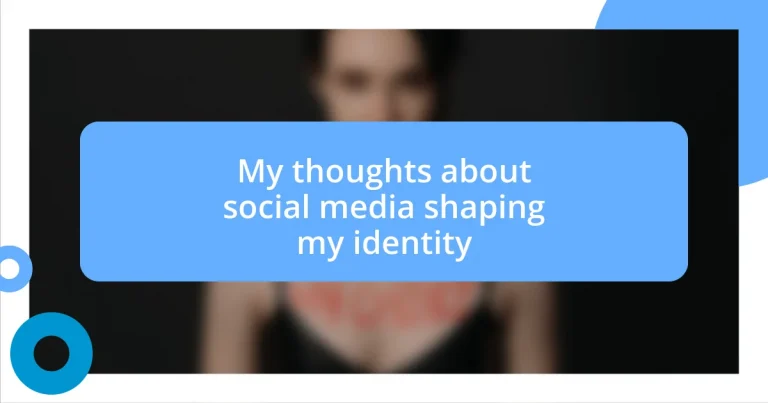Key takeaways:
- Social media significantly influences self-perception and identity, leading to both positive experiences of connection and self-expression, as well as negative effects like comparison and mental health struggles.
- Finding balance between online presence and true self is essential; curating social media feeds and setting boundaries can enhance real-life happiness and personal authenticity.
- Cultivating genuine online relationships involves sincerity, being present in interactions, and sharing vulnerabilities, fostering a supportive community that values authenticity over curated perfection.
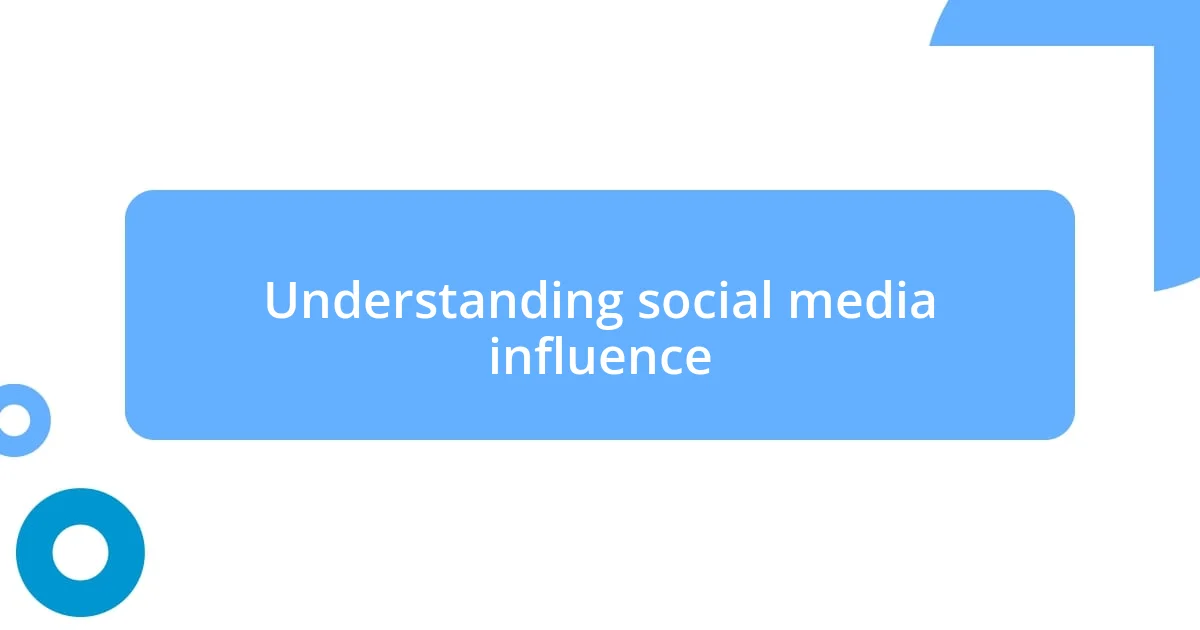
Understanding social media influence
Social media has a unique power to shape our perceptions and self-identity. I still remember the first time a photo I posted received unexpected attention; it made me feel seen in a way that I hadn’t experienced before. Isn’t it interesting how a simple “like” can boost our confidence or, conversely, how a lack of validation can leave us feeling invisible?
Our online interactions often lead us to compare our lives with those of others, sometimes leaving us feeling inadequate. I’ve caught myself scrolling through curated feeds, wondering why my day-to-day life doesn’t seem as glamorous. This constant comparison can blur the lines between our true selves and the identities we project online.
Moreover, social media can amplify certain characteristics of our identity, such as interests or beliefs. When I engaged with communities that shared my passions, it was like finding a piece of myself I didn’t know was missing. Have you ever felt that sense of belonging? It’s powerful how online networks can reinforce our values, shaping who we are and how we see ourselves.
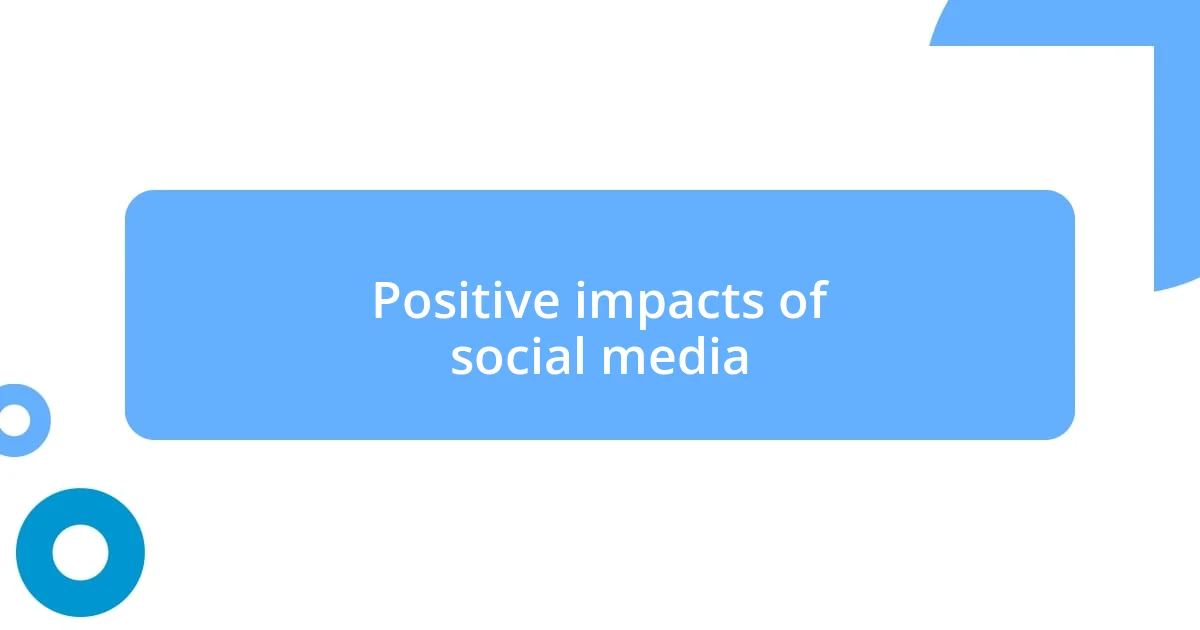
Positive impacts of social media
Social media provides a platform for self-expression that I think is incredibly valuable. I remember creating an Instagram account dedicated solely to my artwork. The feedback I received not only motivated me to improve but also forged connections with other artists. It became a space where I could share my creative identity without fear of judgment, which was liberating.
The ability to connect with like-minded individuals is another profound benefit of social media. Once, during a Twitter chat on mental health, I shared my experiences and found a community that resonated with my struggles. These connections made me feel less alone and highlighted the positive side of our shared vulnerabilities. Isn’t it remarkable how technology can facilitate such genuine human connections?
Moreover, social media acts as an educational tool. Through platforms like YouTube, I’ve discovered countless tutorials that enhanced my skills. I often think about how these resources made learning accessible and engaging for me, breaking the barriers that traditional education sometimes imposes. The ways in which I’ve been able to grow from these platforms are practically limitless.
| Positive Impact | Personal Experience |
|---|---|
| Self-Expression | Shared my artwork on Instagram and felt motivated by the feedback. |
| Community Building | Connected with people during a Twitter chat that resonated with my mental health struggles. |
| Education | Learned new skills through YouTube tutorials, making learning accessible. |
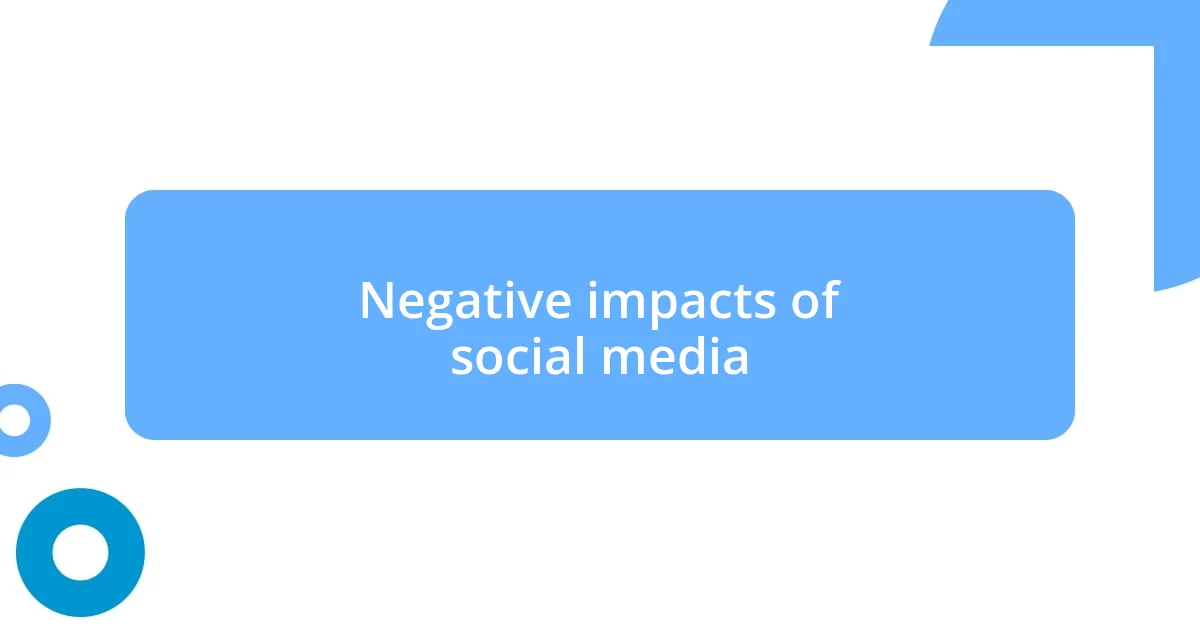
Negative impacts of social media
Social media can have some pretty intense negative effects on our self-perception and overall well-being. I’ve felt that pit in my stomach when watching my friends’ highlight reels while I’m having an off day. It creates this unrealistic standard of happiness and success that feels impossible to reach. The pressure to maintain a certain image online can be overwhelming, forcing us to curate our lives instead of living them.
Here are some of the key negative impacts I’ve noticed, both in my life and in those around me:
- Comparison Trap: I often find myself measuring my worth against the seemingly perfect lives of others, which can lead to feelings of inadequacy.
- Fear of Missing Out (FOMO): Scrolling through posts can ignite that nagging sensation that everyone else is having fun without me, leaving me feeling excluded and lonely.
- Addiction to Validation: The need for likes and comments can become addictive, shifting my self-worth to how others perceive me online rather than valuing my own opinions.
- Mental Health Struggles: I’ve seen how social media can exacerbate anxiety and depression, making it feel like there’s no escape from the constant barrage of curated perfection.
Navigating these negative aspects is a challenging journey. I remind myself that behind every perfect picture, there’s often an imperfect story. It’s a constant balancing act between staying connected and protecting my mental health.
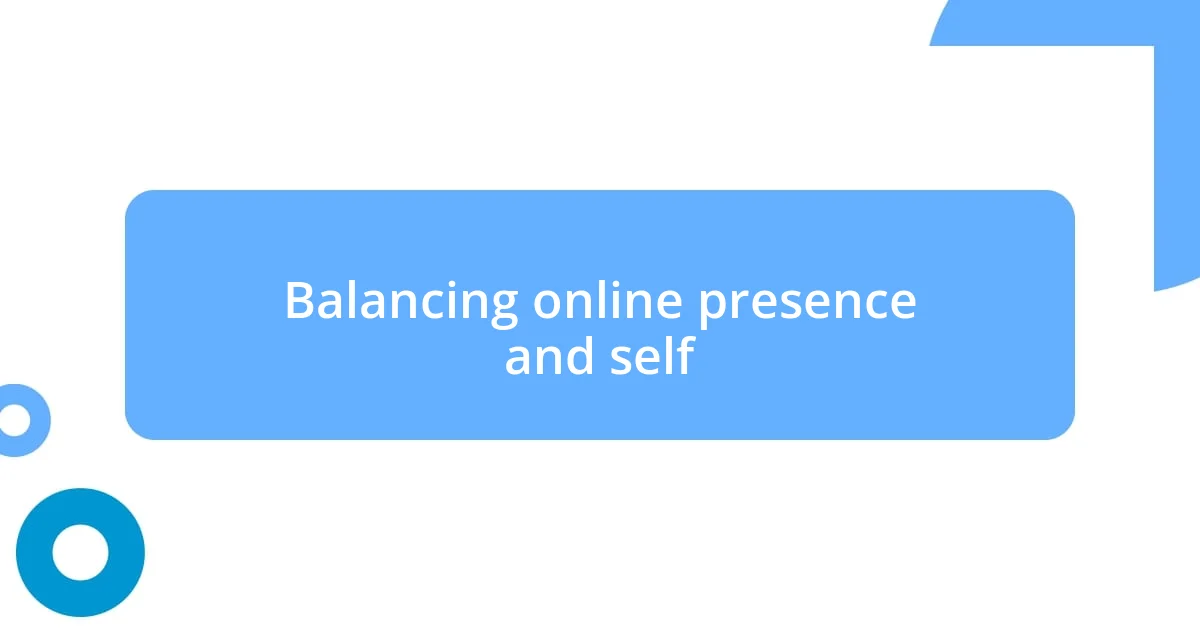
Balancing online presence and self
Finding the right balance between my online presence and my true self has been a journey filled with lessons. I vividly recall a time when I posted a photo that I thought captured a perfect moment in my life, only to be met with silence. It was a sobering realization that the validation I sought didn’t define my worth. How many of us chase likes and comments, missing out on genuine experiences?
Sometimes, I catch myself scrolling for hours, and I wonder if my online activities are enhancing or detracting from my real-life happiness. For instance, during a busy week when I felt overwhelmed, it was social media that distracted me. Yet, I discovered that taking a break allowed me to reconnect with my hobbies—like painting or simply enjoying nature—without the constant noise of notifications. It’s those off-screen moments that often refresh my perspective and reinforce who I truly am.
Maintaining this balance means being intentional with my social media habits. I’ve learned to curate my feed, following accounts that uplift and inspire rather than those that provoke comparison. Hasn’t it been liberating to curate a digital space that reflects my values? It has made a noticeable difference in how I view my online interactions. Essentially, I strive to ensure that my virtual presence complements my real identity, rather than overshadowing it.
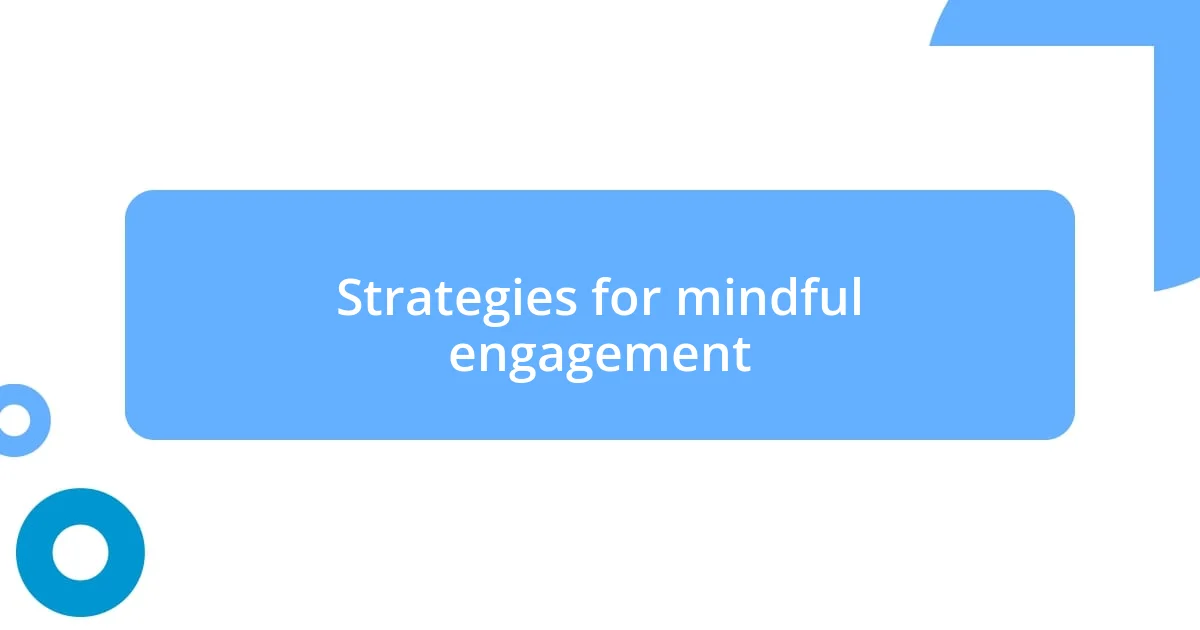
Strategies for mindful engagement
Social media can easily consume our time and emotions, so I’ve found that setting boundaries is crucial. For instance, I try designating “Instagram-free” zones throughout my day—like during meals or before bed. It’s amazing how stepping back fosters deeper connections with the people around me. Don’t you sometimes feel like the chatter from social media drowns out your own thoughts?
Another strategy I embrace is practicing gratitude when scrolling through my feed. Instead of judging my life against the glamorous posts of others, I remind myself of the joy and beauty in my own experiences. I recently revisited old family photos, and it struck me how rich my life truly is, filled with moments that might not get captured online. Isn’t it empowering to celebrate our unique journeys instead of comparing them to others?
I’ve also started sharing my authentic self online, imperfections and all. When I posted a candid photo after a tough day, the overwhelming support I received showed me that vulnerability resonates with others. It’s a reminder that we’re all navigating our struggles. This connection makes social media feel more like a supportive community rather than a standard to meet. Have you tried embracing your true self in your online presence? It might just change how you interact with the digital world.
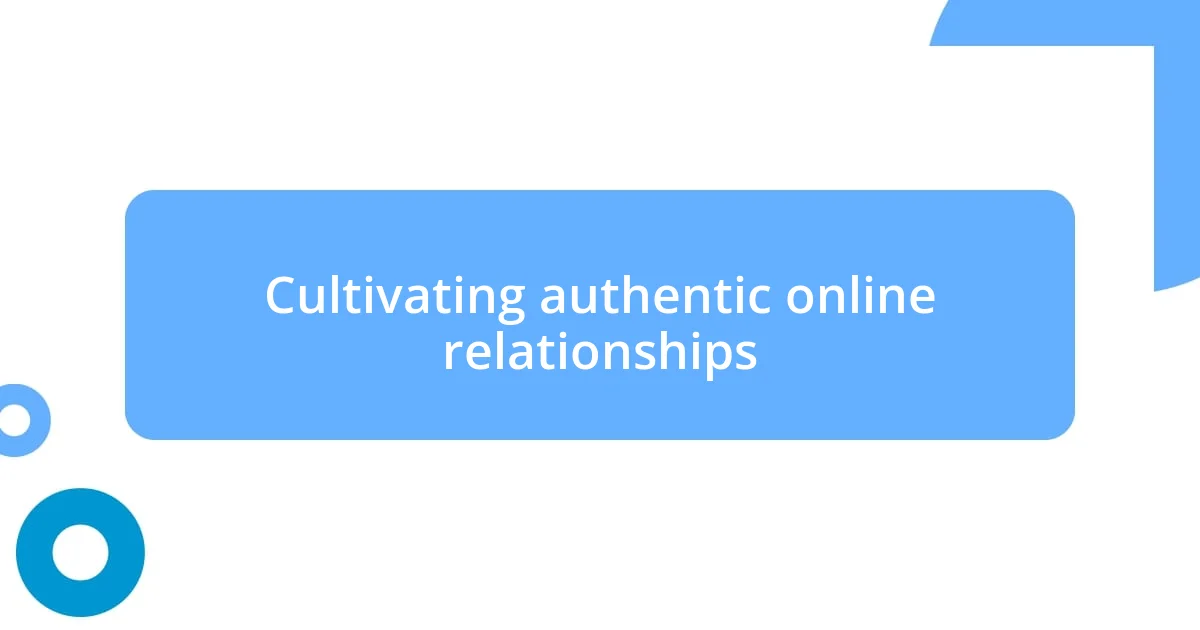
Cultivating authentic online relationships
Cultivating relationships online requires a delicate balance of sincerity and openness. Reflecting on my own experiences, I remember a time when I engaged in a deep conversation with someone I had never met in person. It was refreshing to share thoughts on mutual interests without the pressure of physical meeting. How often do we overlook the potential for connection that lies behind the screens?
Building authentic relationships also means investing time in conversations that matter. I once found myself in a group chat that began as a casual exchange, but soon developed into a supportive network where we celebrated each other’s achievements and shared our struggles. There’s something profoundly rewarding about being part of a space where everyone feels valued. Have you ever considered how just a few genuine interactions can lead to a sense of community?
Another key aspect I focus on is being present in my interactions. I recall a time when I was multitasking during a video call, only to realize I missed out on my friend’s important updates. Since then, I’ve committed to being fully engaged when connecting with others. Isn’t it liberating to know that by simply being attentive, I can nurture these relationships? Cultivating authenticity is about creating a space where both parties can be real, sharing both joys and vulnerabilities without fear of judgment.
